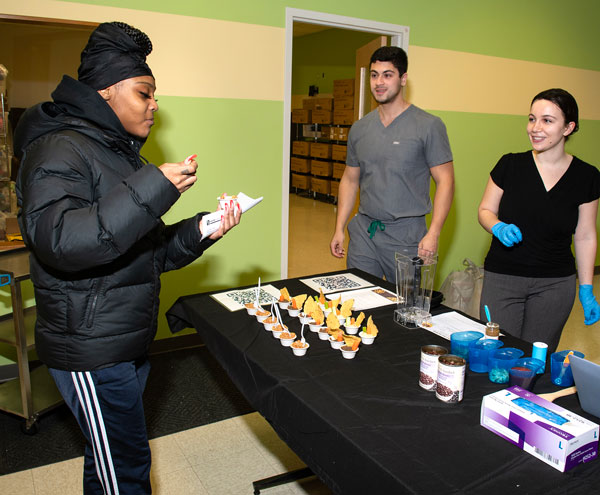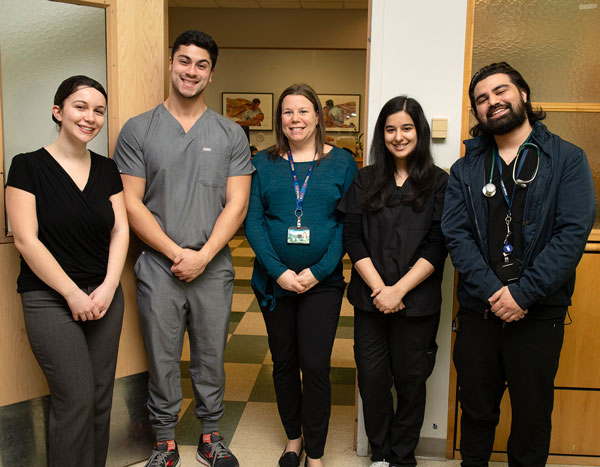From Food Desert to Oasis
Transforming Access to Healthy Ingredients
January 10, 2024What’s for dinner? It’s a question we ask ourselves almost every day.
Thinking about what to eat and shopping for the ingredients can be hard. When you
add in a lack of access to fresh fruits and vegetables, actually cooking a healthy
meal might seem impossible.
The Lancaster Teaching Kitchen is an initiative that hopes to change that.
“We’re starting a research study, and through that, we’re doing weekly food demonstrations
throughout the year that incorporate different foods from the Mediterranean diet,”
said Autumn Dye, DO, assistant professor, family medicine.
“Our clinic is in a food desert, so part of this is getting people excited about using
vegetables and becoming a starting point for change in how people cook.”
Through the demonstrations, patients at the PCOM Lancaster Avenue Division Healthcare Center will learn easy-to-make recipes using grains and green vegetables. This will help
foster a deeper understanding of the benefits of including these items in their daily
diets.
Dye, alongside Kristen Berry, DO, assistant professor, family medicine, and Farzaneh Daghigh, PhD, professor, bio-medical sciences, came up with the idea to promote positive and sustainable
change within the community.
“Our hope is that our patients will learn about healthy foods they may not otherwise
be exposed to and how to prepare them so that they’re tasty,” said Berry.
The Lancaster Teaching Kitchen will show patients how to substitute out an unhealthy
side or snack with one that’s better for their long-term health. This will help many
patients, including those with illnesses that can be greatly improved with lifestyle
modifications.
“Food is indeed a form of medicine in our daily lives,” said Daghigh.
“The aim is to create a comfortable and inviting space for these communities to explore,
experiment, and integrate nutritious elements into their everyday routines. We hope
to not only inform but transform, addressing health disparities and promoting a healthier
lifestyle within underserved communities.”
About Philadelphia College of Osteopathic Medicine
Established in 1899, Philadelphia College of Osteopathic Medicine (PCOM) has trained
thousands of highly competent, caring physicians, health practitioners and behavioral
scientists who practice a “whole person” approach to care—treating people, not just
symptoms. PCOM, a private, not-for-profit accredited institution of higher education,
operates three campuses (PCOM, PCOM Georgia and PCOM South Georgia) and offers doctoral degrees in clinical psychology, educational psychology, osteopathic
medicine, pharmacy, physical therapy, and school psychology. The college also offers
graduate degrees in applied behavior analysis, applied positive psychology, biomedical
sciences, forensic medicine, medical laboratory science, mental health counseling,
physician assistant studies, and school psychology. PCOM students learn the importance
of health promotion, research, education and service to the community. Through its
community-based Healthcare Centers, PCOM provides care to medically underserved populations.
For more information, visit pcom.edu or call 215-871-6100.
Contact Us
For general media inquiries, please contact the Office of Marketing and Communications
at 215-871-6300 or communications@pcom.edu. Visit our media relations page to view contact information for public relations personnel.
Connect with PCOM

 What’s for dinner? It’s a question we ask ourselves almost every day.
What’s for dinner? It’s a question we ask ourselves almost every day. Dye, alongside
Dye, alongside 